‘Protocol has left farmers in no man’s land’ says UFU president Victor
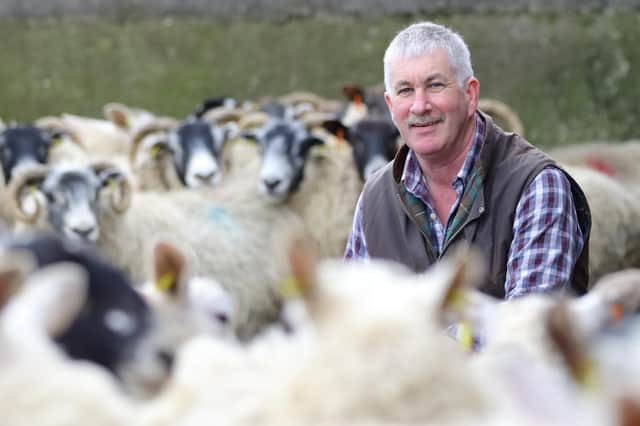

Victor Chestnutt is a sixth generation livestock farmer based on the North Antrim Coast, near the Giants Causeway.
Affable and down-to-earth, and most often to be found in his wellie boots, he is married with two grown up children, Zara who works in the agri food sector and David who works on the sizeable family farm, along with his dedicated wife Carol.
Advertisement
Hide AdAdvertisement
Hide Ad“I went courting in a tractor,” laughs Victor of the time when he met his beloved. “I didn’t have big circles to mix in. She is from White Park Bay, up near the Causeway. We married in 1985. Working together on the farm there’s always so much to do so there’s a lot of give and take.
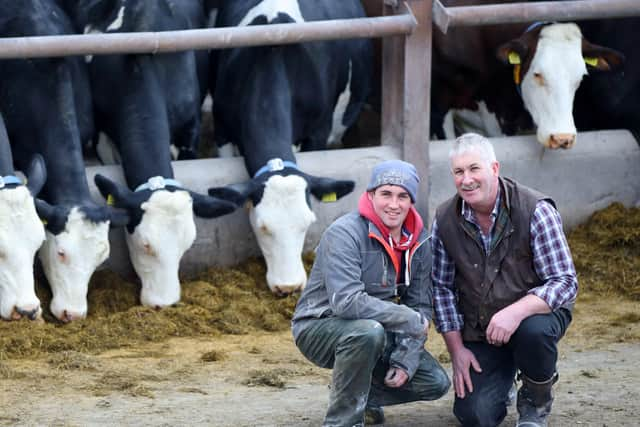

“We have beef cows, dairy cows and sheep - it’s 24/7 work. There is no such thing as a day off for a farmer.
“This is not a job it’s a vocation. I try to help others and want to make things easier for the next generation coming into the farming industry. Sometimes it’s hard work and you want a break and head off, but then when you get back to the farm you think ‘This is pure bliss.’
“I’m a bit of a queer fella in that way in that I love spending time in the fields on my own with the animals. You need to be comfortable with that kind of solitude in nature to be a successful farmer.”
Advertisement
Hide AdAdvertisement
Hide AdVictor studied at Greenmount in 1978 and while always working arduously milking his cows and tending to his cattle he was elected deputy in 2016 and then president of the Ulster Farmer’s Union in 2018, and since then he has found himself at the forefront of NI Protocol negotiations with Michel Barnier, Maros Sefcovic and, before he left the post to be replaced by Liz Truss, Lord Frost.
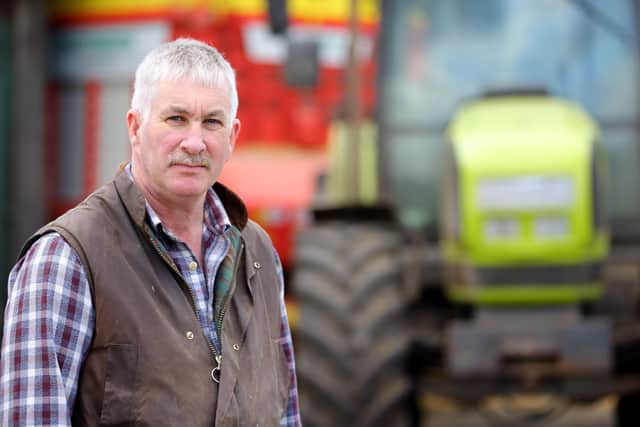

Chestnutt was at first tentatively pleased that the protocol could mean farmers would have what he called “the best of both worlds” in terms of access to both the UK and EU single market, and the hope had been that agriculture could accordingly boom both in terms of the direction of trade across the Irish Sea and between Northern Ireland and the Republic - but it has not turned out that way, and Victor has found himself engaged in very complex discussions about how to reach “pragmatic solutions” that will make the protocol work for one of Ulster’s largest and most economically valuable sectors.
“Some of the current situation is actually working well for farmers because our milk is still going south, our sheep are still going south and our beef can go both across the border and across to the mainland. But there are some big problems. The sale of baby bulls on the mainland has all but stopped. Animal medicines - we could lose access to about 40% of that. Plant protection products - we’re in this half-way house now where neither UK or EU regulations can cover that as we are too small a region for any chemical company to do the necessary authorisation for Northern Ireland. So instead of having the best of both worlds on this we’re in a no man’s land situation.”
He added: “This border in the Irish Sea is causing us huge problems. We can get our products moving fairly well from Northern Ireland across to GB, but if there is any problem with that a return is seriously hard to do. We have problems with organic poultry because if you want to sell it in the UK, then OK, but then if you don’t meet the EU regulations then you can’t, say, sell it in your own town in Antrim.
Advertisement
Hide AdAdvertisement
Hide Ad“We think there are solutions to these problems but it’s all about getting the political will from both sides to enact them. We want to see recognition that Northern Ireland is still an integral part of the UK.
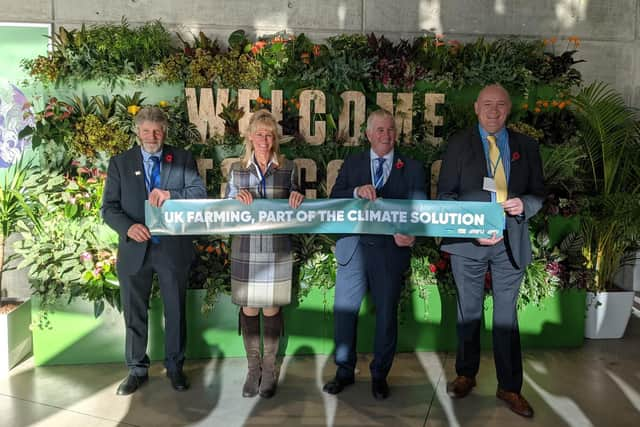

“But things are difficult. For example, say a farmer is ordering an exhaust pipe for a tractor, there are a lot of hoops to jump through. Everything to a Northern Ireland address should be able to come. There was one farmer needing a combine harvester and it took a fortnight for it to arrive and you might only have ten days for a harvest so by the time it arrived it sat in a shed and he was unable to use it.
“We need what I would call a major renovation of the NI Protocol in order to make it workable. We don’t want a border east-west or north-south.
“We were sold this on the idea that farmers would have unfettered access to the GB and EU markets but it has been a case of it working in part like that, but in another sense it hasn’t. There are so many issues to be resolved.
Advertisement
Hide AdAdvertisement
Hide Ad“Farmers who bought sheep and paid to have them initially grazed in Scotland found that they couldn’t get their flock back here once the protocol was introduced and that was majorly chaotic.
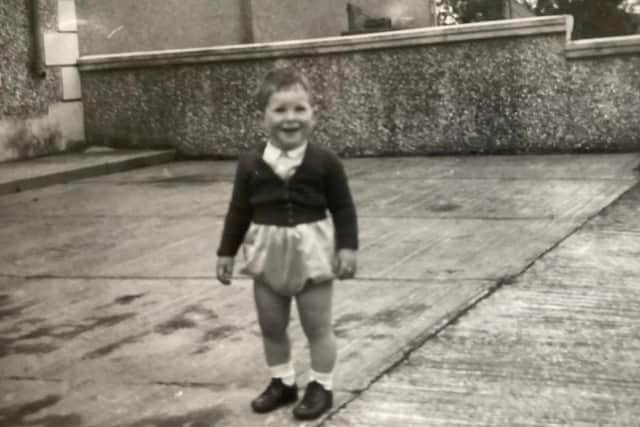

“High end seed potatoes can’t be brought in. The same with seed barley and seed wheat. There are too many checks and tests which is not always financially viable with the result that some crops could not be planted.”
Chestnutt has had to move well out of his comfort zone in giving evidence at Westminster, at the House of Lords and to various committees as well as engaging with academics at Queen’s University and the EU negotiating team, and he describes the latter cohort as initially being anything but helpful.
“Michel Barnier basically said to me ‘Victor, the UK have left [the EU], so don’t come to us with your problems’. But they have moved from there to realising that we need to get these issues sorted. So that was a radical change.
Advertisement
Hide AdAdvertisement
Hide Ad“I’m more hopeful now about a resolution on all this than I was six months ago.”
‘Farming makes over five billion for NI economy annually’
“It’s hard when you have a cow calving in the middle of the night and you have to get up out of your bed and tend to it,” says Victor of the rigours of farming life, which are indeed relentless.
“But despite the stress and the long hours, farming has been good to me, and I’d rather be communing with nature outdoors than being stuck in an office.
“Farming is in my blood.
“To me it is a wonderful way of life and as president of the UFU I am proud to be trying to do my best to see the NI Protocol reformed so that Brexit can work for farmers right across Ulster.”
Advertisement
Hide AdAdvertisement
Hide AdHe emphasises that agriculture is more important to the Northern Ireland economy than any other UK region.
“Farmers in Northern Ireland produce enough food for 10 million people even though we are just a population of 1.6m. We’ve 24, 000 farmers here, and 113,000 jobs in the agri food industry. Farming here contributes five to six billion to the Northern Ireland economy annually.
“So it is vital that we do all that we can to protect it.”
Climate change solutions are needed that will yet protect Ulster’s livestock
Raising awareness of how UK agriculture is part of the climate change solution was the focus for Ulster Farmers’ Union president Victor Chestnutt and parliamentary officer Alexander Kinnear at the United Nations Climate Change Conference (COP26) in Glasgow, held on November 2-4 last year.
Advertisement
Hide AdAdvertisement
Hide Ad“UK agriculture is a uniquely versatile sector, which supplies food, captures and stores carbon and helps to generate clean energy – it is a key part of the climate change solution,” said Chestnutt.
“This was a message which we reiterated alongside our UK farming union counterparts during our visit to COP26. We were very disappointed to see how little presence the UK government gave agriculture at the event considering farming is such a crucial part of the economy.
“Nevertheless, our presence at COP26 was extremely important as we represented our members across NI who are already contributing significantly to the UK target of net zero emissions by 2050, and they recognise this can be improved further with the right policy backed by scientific evidence.
“This is essential to continue making positive progress in combating climate change here in NI and the UK as a whole, supporting our local farmers to play their vital part without lessening their ability to produce quality, sustainable products to world leading standards. But we need a climate change bill that supports local farming and food security here.
Advertisement
Hide AdAdvertisement
Hide Ad“The Ulster Farming community is concerned about proposed climate change legislation because some of these bills, like the one presented by the Green Party’s Claire Bailey, would wipe out farming here.
“In terms of livestock and the emissions that livestock breathe out and the green house gases that are an inevitable consequence of food production, we recognise the problems with climate change, but reducing our livestock would have a devastating impact.
“We know there is change coming but not all farmers want to hear that.
“The challenge for farmers is how we commit to lowering carbon emissions and greenhouse gases while at the same time maintaining our livestock.
Advertisement
Hide AdAdvertisement
Hide Ad“But we can’t have a bill that comes in that would wipe out 86% of livestock in Northern Ireland. We commissioned a report from KPMG on the impact that Claire Bailey’s bill would have on farming here and that is the figure they came back to us with. We are very concerned about this.”
Victor added: “I sometimes think we need more concentration on biodiversity. We need our animals to graze our hills after all.”
Q&A: ‘I love to see the emergence of new life in the spring’
Tell us some of your earliest childhood memories?
I grew up on a farm two or three miles from the Giant’s Causeway between Bushmills and Ballycastle.
Advertisement
Hide AdAdvertisement
Hide AdI remember a big snow fall in 1963 and trying to turn cows down the lane - there I was aged three trying to turn a bunch of cattle so that we could get a tractor up there.
I love the variety of farming work and especially watching the emergence of new life in the spring when lambs are born. There are plenty of buzzes and plenty of highs but also lows and challenges.
You do get attached to the animals, because you know them, and when they have to go it is sad but you know that is the reality.
Did you enjoy your school days?
I sat in school and looked out of the window most of the time.
How would you spend an ideal day off?
Advertisement
Hide AdAdvertisement
Hide AdI would probably go to an agricultural show or a sheep sale or go and take a look at agricultural practices in some other country.
Who makes you laugh the most?
I think I laugh at myself a lot.
Who is your best friend?
My wife Carol, I couldn’t do this without her support and no, she’s not always my trouble and strife.
What kind of music do you most enjoy?
Country music for sure.
Do you like to read?
I would read my Bible every day.
If you could have a dream dinner party to which you could invite anyone from history who would you bring?
An ancestor of mine from two or 300 years ago. His surname was Boyd which is my middle name and he was responsible for setting up the railway that runs through Ballycastle. I would love to find out what drove him and how he achieved what he did. My wife is a brilliant cook so she would have to step in, and we’d have a good steak with pepper sauce, potatoes and vegetables.
What do you most enjoy in your downtime?
Advertisement
Hide AdAdvertisement
Hide AdI love watching sports of any kind but especially the Premiere League. I support Manchester United but they aren’t doing well at the moment.
One of your proudest achievements as UFU president?
I set up a support service for farmers who lose people in untimely circumstances. When somebody dies in a farming family it can be so difficult because there are so many things to be dealt with, the land, the ongoing need to look after the animals, none of that cycle stops in the midst of loss, cows still have to be milked, even when a farming family is in the midst of grief. The initiative is called Life Beyond and it runs with the help of Rural Support.
A message from the Editor:
Thank you for reading this story on our website. While I have your attention, I also have an important request to make of you.
With the coronavirus lockdown having a major impact on many of our advertisers — and consequently the revenue we receive — we are more reliant than ever on you taking out a digital subscription.
Advertisement
Hide AdAdvertisement
Hide AdSubscribe to newsletter.co.uk and enjoy unlimited access to the best Northern Ireland and UK news and information online and on our app. With a digital subscription, you can read more than 5 articles, see fewer ads, enjoy faster load times, and get access to exclusive newsletters and content. Visit https://www.newsletter.co.uk/subscriptions now to sign up.
Our journalism costs money and we rely on advertising, print and digital revenues to help to support them. By supporting us, we are able to support you in providing trusted, fact-checked content for this website.
Ben Lowry
Editor
Comment Guidelines
National World encourages reader discussion on our stories. User feedback, insights and back-and-forth exchanges add a rich layer of context to reporting. Please review our Community Guidelines before commenting.